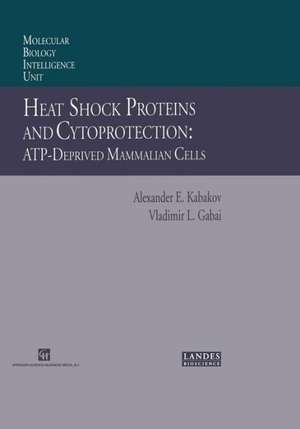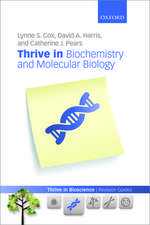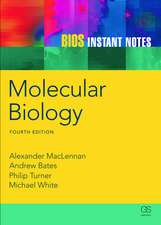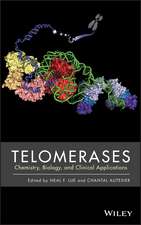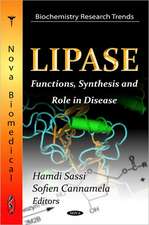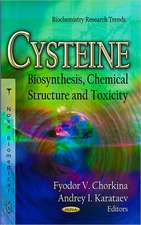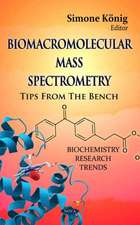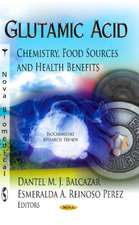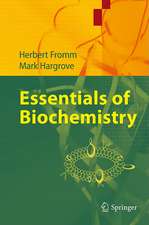Heat Shock Proteins and Cytoprotection: Atp-Deprived Mammalian Cells: Molecular Biology Intelligence Unit
Autor Alexander E. Kabakov, Vladimir L. Gabaien Limba Engleză Paperback – 24 oct 2012
| Toate formatele și edițiile | Preț | Express |
|---|---|---|
| Paperback (1) | 628.57 lei 6-8 săpt. | |
| Springer Us – 24 oct 2012 | 628.57 lei 6-8 săpt. | |
| Hardback (1) | 636.09 lei 6-8 săpt. | |
| Springer Us – 15 mar 1997 | 636.09 lei 6-8 săpt. |
Din seria Molecular Biology Intelligence Unit
- 5%
 Preț: 663.60 lei
Preț: 663.60 lei - 18%
 Preț: 1204.16 lei
Preț: 1204.16 lei - 5%
 Preț: 1069.03 lei
Preț: 1069.03 lei - 24%
 Preț: 775.98 lei
Preț: 775.98 lei - 18%
 Preț: 1201.70 lei
Preț: 1201.70 lei - 15%
 Preț: 629.52 lei
Preț: 629.52 lei - 5%
 Preț: 1076.21 lei
Preț: 1076.21 lei - 15%
 Preț: 625.20 lei
Preț: 625.20 lei - 18%
 Preț: 925.84 lei
Preț: 925.84 lei - 5%
 Preț: 701.61 lei
Preț: 701.61 lei - 20%
 Preț: 552.98 lei
Preț: 552.98 lei - 5%
 Preț: 1074.40 lei
Preț: 1074.40 lei - 5%
 Preț: 1075.45 lei
Preț: 1075.45 lei - 18%
 Preț: 923.83 lei
Preț: 923.83 lei - 18%
 Preț: 1197.68 lei
Preț: 1197.68 lei - 5%
 Preț: 1380.37 lei
Preț: 1380.37 lei - 18%
 Preț: 927.84 lei
Preț: 927.84 lei - 5%
 Preț: 1072.43 lei
Preț: 1072.43 lei - 18%
 Preț: 926.63 lei
Preț: 926.63 lei - 24%
 Preț: 1053.39 lei
Preț: 1053.39 lei - 24%
 Preț: 786.18 lei
Preț: 786.18 lei - 24%
 Preț: 789.89 lei
Preț: 789.89 lei - 18%
 Preț: 926.46 lei
Preț: 926.46 lei - 5%
 Preț: 1073.69 lei
Preț: 1073.69 lei - 5%
 Preț: 1400.27 lei
Preț: 1400.27 lei - 24%
 Preț: 817.70 lei
Preț: 817.70 lei - 5%
 Preț: 1082.46 lei
Preț: 1082.46 lei - 18%
 Preț: 928.64 lei
Preț: 928.64 lei - 15%
 Preț: 627.93 lei
Preț: 627.93 lei - 18%
 Preț: 932.01 lei
Preț: 932.01 lei - 5%
 Preț: 1073.53 lei
Preț: 1073.53 lei - 18%
 Preț: 931.09 lei
Preț: 931.09 lei - 18%
 Preț: 927.37 lei
Preț: 927.37 lei - 18%
 Preț: 933.59 lei
Preț: 933.59 lei - 5%
 Preț: 700.18 lei
Preț: 700.18 lei - 18%
 Preț: 927.24 lei
Preț: 927.24 lei - 18%
 Preț: 928.64 lei
Preț: 928.64 lei - 18%
 Preț: 936.65 lei
Preț: 936.65 lei - 5%
 Preț: 1293.02 lei
Preț: 1293.02 lei - 5%
 Preț: 1076.37 lei
Preț: 1076.37 lei - 18%
 Preț: 925.06 lei
Preț: 925.06 lei - 18%
 Preț: 931.26 lei
Preț: 931.26 lei - 24%
 Preț: 782.70 lei
Preț: 782.70 lei - 18%
 Preț: 934.33 lei
Preț: 934.33 lei - 15%
 Preț: 627.11 lei
Preț: 627.11 lei - 5%
 Preț: 1578.00 lei
Preț: 1578.00 lei - 18%
 Preț: 928.16 lei
Preț: 928.16 lei - 18%
 Preț: 1206.35 lei
Preț: 1206.35 lei - 15%
 Preț: 635.95 lei
Preț: 635.95 lei - 18%
 Preț: 1206.18 lei
Preț: 1206.18 lei
Preț: 628.57 lei
Preț vechi: 739.49 lei
-15% Nou
Puncte Express: 943
Preț estimativ în valută:
120.30€ • 124.96$ • 99.92£
120.30€ • 124.96$ • 99.92£
Carte tipărită la comandă
Livrare economică 01-15 februarie 25
Preluare comenzi: 021 569.72.76
Specificații
ISBN-13: 9781461377528
ISBN-10: 1461377528
Pagini: 256
Ilustrații: XVI, 237 p.
Dimensiuni: 178 x 254 x 13 mm
Greutate: 0.45 kg
Ediția:Softcover reprint of the original 1st ed. 1997
Editura: Springer Us
Colecția Springer
Seria Molecular Biology Intelligence Unit
Locul publicării:New York, NY, United States
ISBN-10: 1461377528
Pagini: 256
Ilustrații: XVI, 237 p.
Dimensiuni: 178 x 254 x 13 mm
Greutate: 0.45 kg
Ediția:Softcover reprint of the original 1st ed. 1997
Editura: Springer Us
Colecția Springer
Seria Molecular Biology Intelligence Unit
Locul publicării:New York, NY, United States
Public țintă
ResearchCuprins
1. Heat Shock Proteins and the Regulation of Heat Shock Gene Expression in Eukaryotes.- 1.1. The Family of Stress Proteins and Molecular Chaperones.- 1.2. The Regulation of Heat Shock Gene Expression in Eukaryotes.- Concluding Remarks.- 2. ATP Homeostasis, Ionic Balance and Cell Viability.- 2.1. ATP Homeostasis in Mammalian Cells.- 2.2. Cell Viability and ATP Depletion.- 2.3. Significance of Ionic Imbalance for the Death of ATP-Depleted Cells.- 2.4. Mitochondrial Dysfunction and Damage During Ischemia.- Concluding Remarks.- 3. “Proteotoxicity” of ATP Depletion: Disruption of the Cytoskeleton, Protein Aggregation and Involvement of Molecular Chaperones.- 3.1. The Cytoskeleton Under ATP Deprivation.- 3.2. Protein Aggregation in Energy-Deprived Cells.- 3.3. How Do Heat Shock Proteins Respond to ATP Depletion?.- Concluding Remarks.- 4. ATP Depletion as Inducer of Heat Shock Protein Expression.- 4.1. Anoxia and Mitochondrial Inhibitors Activate HSP Gene Expression.- 4.2. Ischemia-Induced HSP Synthesis in the Heart.- 4.3. Stress Protein Expression in Post-Ischemic Brain.- 4.4. Ischemia-Induced Stress Protein Synthesis in Other Normal Tissues and Tumor Cells.- 4.5. Possible Mechanisms of HSP Accumulation After ATP Depletion.- Concluding Remarks.- 5. Heat Shock Proteins and Cardioresistance to Ischemia.- 5.1. Heat Shock-Induced Cardioresistance to Ischemia/Reperfusion Injury.- 5.2. The Role of Myocardial HSPs in Ischemie Preconditioning.- 5.3. The Cardioresistance Induced by Other Stimuli Can Also Be Associated with HSPs.- 5.4. Evidence for the Involvement of HSP70 in Cardioprotection.- 5.5. Are Other Stress Proteins Cardioprotective?.- Concluding Remarks.- 6. Involvement of Heat Shock Proteins in Protection of Various Normal and Tumor Cells from Ischemic Insult.- 6.1. HSPsand Ischemic Tolerance in the Brain.- 6.2. Ischemic Tolerance in the Kidney.- 6.3. HSPs and Protection from Ischemia of Other Organs and Tissues.- 6.4..- Concluding Remarks.- 7. What Are the Mechanisms of Heat Shock Protein-Mediated Cytoprotection Under ATP Deprivation?.- 7.1. Two Paradigms of Cell Tolerance to ATP Deprivation: Reduced Injury During the Stress and the Improved Post-Stress Recovery.- 7.2. Chaperoning Under ATP Depletion as a Special Function of HSP70.- 7.3. How Other Stress Proteins Might Maintain the Viability of ATP-Deprived Cells.- 7.4. How Do HSPs Protect Cells against Necrosis during ATP Depletion?.- 8. Mechanisms of Heat Shock Protein-Mediated Protection from Ischemia-Induced Apoptosis.- 8.1. HSPs and Triggering of Apoptosis in Ischemic Cells.- 8.2. HSPs and Transduction of the Apoptotic Signal.- 8.3. HSPs and the Execution of Apoptosis.- 9. Conclusions and Perspectives.- 9.1. Adaptation to Energy Starvation on The Molecular Level.- 9.2. Heat Shock Proteins and Ischemia: Significance for Medicine.- Concluding Remarks.
